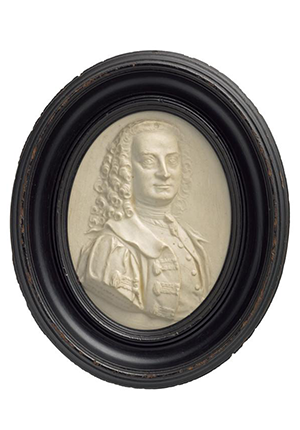Historic Document
Inquiry into the Original of our Ideas of Beauty and Virtue
Francis Hutcheson | 1725

National Galleries of Scotland, Purchased 1890
Summary
Francis Hutcheson (1694-1746) was a leading figure in the Scottish Enlightenment and author of the Inquiry into the Original of our Ideas of Beauty and Virtue (1725). Founder of the “common sense” school of moral philosophy, Hutcheson resurrected Cicero’s idea that our minds have an innate “moral sense” or conscience, which disposes us to act benevolently toward others. For Hutcheson and the “moral sense” philosophers, morality was, in part, a matter of sentiment or feeling, rather than purely the result of a reasoned calculation of costs and benefits, short-term pleasure balanced against long-term pain. In the excerpt below, Hutcheson offers a crisp account of the distinction between alienable and unalienable rights. It would prove influential for key members of the Founding generation—for instance, shaping James Madison’s Memorial and Remonstrance against Religious Assessments and Thomas Jefferson’s original draft of the Virginia Statute for Religious Freedom.
Selected by

Paul Rahe
Professor of History and Charles O. Lee and Louise K. Lee Chair in the Western Heritage at Hillsdale College

Jeffrey Rosen
President and CEO, National Constitution Center

Colleen A. Sheehan
Professor of Politics at the Arizona State University School of Civic and Economic Thought and Leadership
Document Excerpt
Rights alienable, and unalienable.
VII. There is another important Difference of Rights, according as they are Alienable, or Unalienable. To determine what Rights are alienable, and what not, we must take these two Marks:
1st. If the Alienation be within our natural Power, so that it be possible for us in Fact to transfer our Right; and if it be so, then,
2dly. It must appear, that to transfer such Rights may serve some valuable Purpose.
By the first Mark it appears, “That the Right of private Judgment, or of our inward Sentiments, is unalienable;” since we cannot command ourselves to think what either we our selves, or any other Person pleases. So are also our Internal Affections, which necessarily arise according to our Opinions of their Objects. By the second Mark it appears, “That our Right of serving God, in the manner which we think acceptable, is not alienable;” because it can never serve any valuable purpose, to make Men worship him in a way which seems to them displeasing to him. The same way, a direct Right over our Lives or Limbs, is not alienable to any Person; so that he might at Pleasure put us to death, or maim us. We have indeed a Right to hazard our Lives in any good Action which is of importance to the Publick; and it may often serve a most valuable end, to subject the direction of such perilous Actions to the Prudence of others in pursuing a publick Good; as Soldiers do to their General, or to a Council of War: and so far this Right is alienable. These may serve as Instances to shew the use of the two Marks of alienable Rights, which must both concur to make them so, and will explain the manner of applying them in other Cases.
The Foundation of Property.
VIII. That we may see the Foundation of some of the more important Rights of Mankind, let us observe, that probably nine Tenths, at least, of the things which are useful to Mankind, are owing to their Labour and Industry; and consequently, when once Men become so numerous, that the natural Product of the Earth is not sufficient for their Support, or Ease, or innocent Pleasure; a necessity arises, for the support of the increasing System, that such a Tenour of Conduct be observ’d, as shall most effectually promote Industry; and that Men abstain from all Actions which would have the contrary effect. It is well known, that general Benevolence alone, is not a Motive strong enough to Industry, to bear Labour and Toil, and many other Difficultys which we are averse to from Self-love. For the strengthning therefore our Motives to Industry, we have the strongest Attractions of Blood, of Friendship, of Gratitude, and the additional Motives of Honour, and even of external Interest. Self-love is really as necessary to the Good of the Whole, as Benevolence; as that Attraction which causes the Cohesion of the Parts, is as necessary to the regular State of the Whole, as Gravitation. Without these additional Motives, Self-love would generally oppose the Motions of Benevolence, and concur with Malice, or influence us to the same Actions which Malice would. “That Tenour of Action then, which would take away the stronger Ties of Benevolence, or the additional Motives of Honour and Advantage, from our Minds, and so hinder us from pursuing industriously that Course which really increases the Good of the Whole, is evil; and we are oblig’d to shun it.”
First then, the depriving any Person of the Fruits of his own innocent Labour, takes away all Motives to Industry from Self-love, or the nearer Ties; and leaves us no other Motive than general Benevolence: nay, it exposes the Industrious as a constant Prey to the Slothful, and sets Self-love against Industry. This is the Ground of our Right of Dominion and Property in the Fruits of our Labours; without which Right, we could scarce hope for any Industry, or any thing beyond the Product of uncultivated Nature. Industry will be confin’d to our present Necessitys, and cease when they are provided for; at least it will only continue from the weak Motive of general Benevolence, if we are not allow’d to store up beyond present Necessity, and to dispose of what is above our Necessitys, either in Barter for other kinds of Necessarys, or for the Service of our Friends or Familys. And hence appears the Right which Men have to lay up for the future, the Goods which will not be spoil’d by it; of alienating them in Trade; of Donation to Friends, Children, Relations: otherwise we deprive Industry of all the Motives of Self-love, Friendship, Gratitude, and natural Affection. The same Foundation there is for the Right of Disposition by Testament. The Presumption of this Disposition, is the Ground of the Right of Succession to the Intestate.




